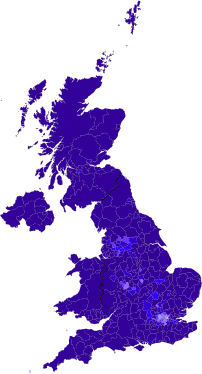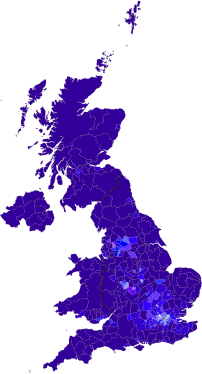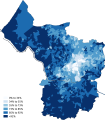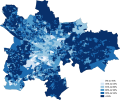
A | B | C | D | E | F | G | H | CH | I | J | K | L | M | N | O | P | Q | R | S | T | U | V | W | X | Y | Z | 0 | 1 | 2 | 3 | 4 | 5 | 6 | 7 | 8 | 9
This article possibly contains original research. (October 2022) |
 Geographic distribution of White people in the United Kingdom (2011) | |
| Total population | |
|---|---|
Northern Ireland: 1,841,713 – 96.8% (2021)[3] | |
| Languages | |
| British English · Hiberno-English · Polish · Romanian · Welsh Angloromani · Beurla Reagaird · Cornish · French · German · Irish · Italian · Scottish Gaelic · Shelta | |
| Religion | |
| Predominantly Christianity (51.3%); minority follows other faiths (1.6%)[a] or are irreligious (41.3%) 2021 census, NI, England and Wales only[4][5] | |
| Related ethnic groups | |
| White Americans · White South Africans · White Australians · White New Zealanders · Irish People · White Canadians |
White people in the United Kingdom are a multi-ethnic group consisting of indigenous and European UK residents who identify as and are perceived to be 'white people'. White people constitute the historical and current majority of the people living in the United Kingdom, with 83.0% of the population identifying as white in the 2021 United Kingdom census.
The Office for National Statistics designates white people into several subgroups, with small terminology variations between the administrative jurisdictions of England and Wales, Scotland and Northern Ireland. These are local: White British, White Irish, White Gypsy or Irish Traveller, and immigrant descended Other White, and in Scotland; White Polish. In Northern Ireland ethnic group data is collected differently, where only the term 'White' is used, and with National Identity ('British', 'Irish', 'Northern Irish', or combinations) collected separately.
British nationality law governs modern British citizenship and nationality, and can influence who may be defined, whether informally, in media and academia, or UK Government statistics, as white Britons or white British people. Millions of white people in the United Kingdom, who hold British citizenship, do not identify with the White British ethnicity classification (or its subgroups, such as 'White English', 'White Welsh' or 'White Scottish') at censuses.[citation needed]
Outside of the census, white people in Great Britain have been the subject of academic research, and have featured in public discourse in international and British media, in which they often are identified as a broad racial or social class within the country.[citation needed]
Terminology and background
White people in the United Kingdom are studied, polled, and analysed as a demographic, anthropological, economic, and social grouping. The scope of the definition often exceeds categorisation by the Office for National Statistics, and its ethnicity or nation-defined subcategories, such as White British or White Polish.[citation needed]
Census
Within the Census in the United Kingdom, the Office for National Statistics collects information on white people who are resident in the United Kingdom, regardless of citizenship status. As censuses have progressed each decade, further categories have been included to accommodate subgroupings of white people in the country. As of the 2011 census, these subgroups are White British, White Irish, White Gypsy or Irish Traveller, White Polish (in Scotland), and Other White. There are small variations between the phrasing or terminology of these categories across the administrative regions of England and Wales, Scotland and Northern Ireland.[6]
Use in academia and government
A multitude of scholars, academics, statisticians, and scientists, as well as government departments, think tanks, trade unions, and charities, have identified white people in the United Kingdom as an observable demographic, historical, anthropological, economic, social and racial grouping.
In governmental terms, the UK Government uses the category of white people to help define and understand demography in the country. The Office for National Statistics collects census information on white people.[6] Devolved administrations, such as the Scottish Government and Welsh Government make use of the racial category for social and equality impacts.[7][8] Ministerial departments such as the Home Office and Ministry of Justice,[9][10] non-ministerial, such as the Cabinet Office and office for Mayor of London,[11][12] HM Inspectorate of Constabulary,[13] and public bodies such as the Equality and Human Rights Commission,[14] and UK Statistics Authority, have produced research and analysis on, what they have defined as, white persons within the country.[15][16]
Academic, research and statistical organisations, such as British Election Study, NatCen Social Research and ICM Research, Savanta ComRes, define and categorise whites living in the UK, in order to study and poll respondents of all backgrounds.[17][18][19][20] Think tanks, including the Policy Studies Institute, Resolution Foundation, Smith Institute and Social Issues Research Centre, utilise the grouping of white people in the United Kingdom,[21][7][22][23] along with Stroke Association and Trades Union Congress.[24][25]
Sociologists, social scientists, and academics of race and ethnicity, such as Peter J. Aspinall, Richard Dyer and Mary J. Hickman identify whites in Britain as an intersecting social and racial category.[26][27][28]
Homogeneity myths and exclusions
Anthropologists Jeanette Edwards, Gillian Evans and Katherine Smith published in 2012:[29]
Anthropological studies that have focused on white people in Britain have, however, undermined the imagined homogeneity of white Britishness, particularly with respect to differences of class and territorial affiliation. For example, Ronnie Frankenberg's (1957) ethnography of a mining village in North Wales in the 1950s showed sharp divisions, made locally, between insiders and outsiders, and this division is repeated over again in subsequent ethnographic examples from Britain (e.g., Edwards 2000; Rapport 1993; Strathern 1981).
White Irish
University of the West of Scotland's Chris Gilligan argues that; "The idea that White people in the United Kingdom constitute a race or ethnic group is based on racialised thinking. It works with the logic of the race relations framework, it does not challenge it."[30] In her 2015 research, University of Southampton fellow Rosalind Willis studied the intersection of the White Irish category in England, where there have been examples of distinctions made against the White British which are culturally rejected or ignored.[31] In this regard, professor Mary J. Hickman has written how a combination of othering the ethnic Irish, and a presupposition of the positivity of integration, has provided "tacit support for the 'myth of homogeneity' of white people in Britain".[27]
In July 2019, the East Ham constituency Labour branch was criticised for its election of a white Irish woman as the women’s officer for its Black, Asian and Minority Ethnic (BAME) forum. The woman in question self-identified as being an ethnic minority and no objections within the branch were raised against her election. Branch secretary, Syed Taqi Shah commented that "if somebody self-declares , and the Labour Party allows them to do so, they should be respected."[32][33]
Demographics

White people are the current and historical majority of the United Kingdom's population. The 2011 United Kingdom census recorded 55,010,359 of White and 63,193 of Gypsy/Traveller/Irish Traveller ethnicity, making a total white population of 55,073,552 or 87.2 per cent of the total population. These figures did not include self-reported people of mixed ethnicity.[6][34]
- White population mapped in local authorities
-
1991 (94.65%)Less than 45%45 - 60%60 - 75%75 - 85%85 - 90%90 - 95%More than 95%
-
2001 (92.12%)Less than 45%45 - 60%60 - 75%75 - 85%85 - 90%90 - 95%More than 95%
-
2011 (87.17%)Less than 45%45 - 60%60 - 75%75 - 85%85 - 90%90 - 95%More than 95%
Population in constituent nations of the United Kingdom
| United Kingdom NUTS 1 Region's | Year | |||||||||||
|---|---|---|---|---|---|---|---|---|---|---|---|---|
| 1971 estimations[35][36][37] | 1981 estimations[38][39][40][37] | 1991[41] | 2001[42][43][44] | 2011[45][46][47] | 2021[48] | |||||||
| Number | Percentage | Number | Percentage | Number | Percentage | Number | Percentage | Number | Percentage | Number | Percentage | |
| Northern Ireland | – | – | – | – | – | – | 1,672,698 | 99.25% | 1,779,750 | 98.28% | 1,841,713 | 96.77% |
| – | 99.6% | 4,908,140 | 99.1% | 4,935,933 | 98.74% | 4,960,334 | 97.99% | 5,084,407 | 96.02% | 5,051,875 | 92.9% | |
| – | 99.6% | 2,788,533 | 99.1% | 2,793,522 | 98.5% | 2,841,505 | 97.9% | 2,928,253 | 95.6% | 2,915,848 | 94.2% | |
| – | – | – | 95.4% | 44,144,339 | 93.8% | 44,679,361 | 91% | 45,281,142 | 85.4% | 45,783,401 | 81% | |
| North East England | – | 99.6% | 2,544,069 | 99% | 2,507,133 | 98.6% | 2,455,416 | 97.61% | 2,475,567 | 95.32% | 2,462,720 | 93.1% |
| South West England | – | – | – | – | 4,546,848 | 98.6% | 4,815,316 | 97.7% | 5,046,429 | 95.41% | 5,309,608 | 93.1% |
| North West England | – | 98.7% | 6,580,840 | 97.5% | 6,480,131 | 96.3% | 6,355,495 | 94.43% | 6,361,716 | 90.2% | 6,347,394 | 85.6% |
| Yorkshire and the Humber | – | 98.1% | 4,600,341 | 96.8% | 4,622,503 | 95.6% | 4,641,263 | 93.48% | 4,691,956 | 88.8% | 4,679,965 | 85.5% |
| East of England | – | 99.3% | – | 98.5% | 4,891,675 | 96.8% | 5,125,003 | 95.11% | 5,310,194 | 90.81% | 5,478,364 | 86.5% |
| East Midlands | – | 98% | 3,598,625 | 96.2% | 3,765,389 | 95.2% | 3,900,380 | 93.48% | 4,046,356 | 89.26% | 4,179,774 | 85.7% |
| South East England | – | – | – | – | 7,271,256 | 96.9% | 7,608,989 | 95.10% | 7,827,820 | 90.65% | 8,009,38 | 86.2% |
| West Midlands | – | 95.9% | 4,716,950 | 93.5% | 4,725,824 | 91.8% | 4,674,296 | 88.74% | 4,633,669 | 82.7% | 4,585,024 | 77% |
| Greater London | – | 92.6% | 5,663,496 | 85.7% | 5,333,580 | 79.8% | 5,103,203 | 71.2% | 4,887,435 | 59.8% | 4,731,172 | 53.8% |
| Overall in the United Kingdom: | – | 97.5% | – | 96% | 51,873,794 | 94.5% | 54,153,898 | 92.12% | 55,073,552 | 87.2% | 55,592,837 | 83.0% |
Population in metropolitan areas
- White population in LAD areas (2011)
-
Zdroj:https://en.wikipedia.org?pojem=White_people_in_the_United_Kingdom
Text je dostupný za podmienok Creative Commons Attribution/Share-Alike License 3.0 Unported; prípadne za ďalších podmienok. Podrobnejšie informácie nájdete na stránke Podmienky použitia.
Antropológia
Aplikované vedy
Bibliometria
Dejiny vedy
Encyklopédie
Filozofia vedy
Forenzné vedy
Humanitné vedy
Knižničná veda
Kryogenika
Kryptológia
Kulturológia
Literárna veda
Medzidisciplinárne oblasti
Metódy kvantitatívnej analýzy
Metavedy
Metodika
Text je dostupný za podmienok Creative
Commons Attribution/Share-Alike License 3.0 Unported; prípadne za ďalších
podmienok.
Podrobnejšie informácie nájdete na stránke Podmienky
použitia.
www.astronomia.sk | www.biologia.sk | www.botanika.sk | www.dejiny.sk | www.economy.sk | www.elektrotechnika.sk | www.estetika.sk | www.farmakologia.sk | www.filozofia.sk | Fyzika | www.futurologia.sk | www.genetika.sk | www.chemia.sk | www.lingvistika.sk | www.politologia.sk | www.psychologia.sk | www.sexuologia.sk | www.sociologia.sk | www.veda.sk I www.zoologia.sk






